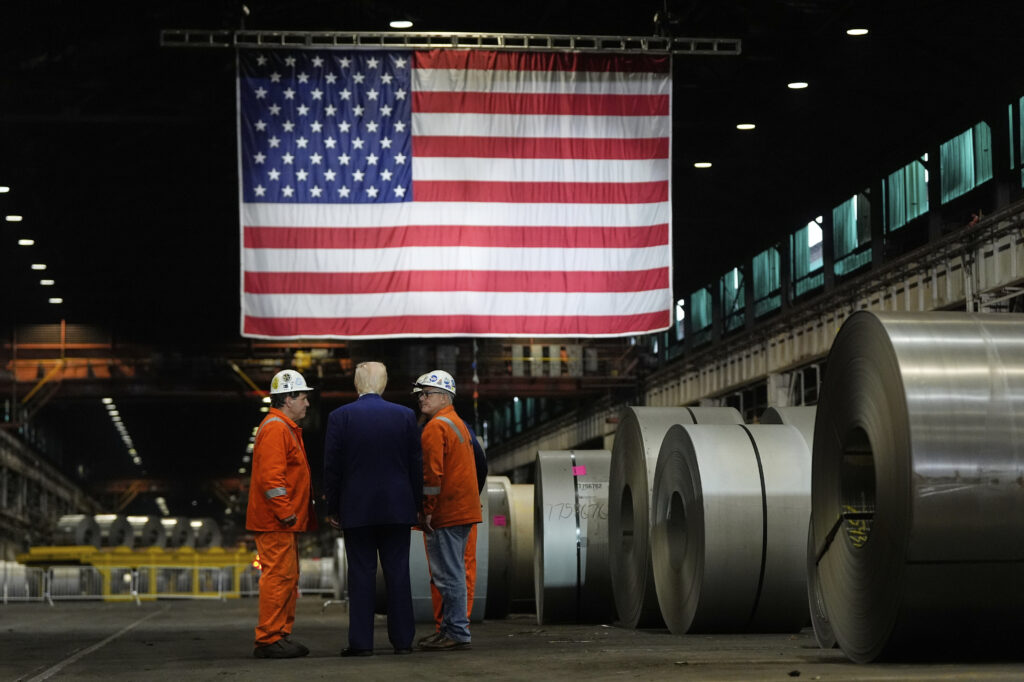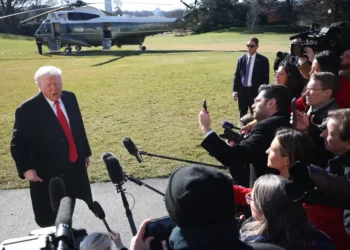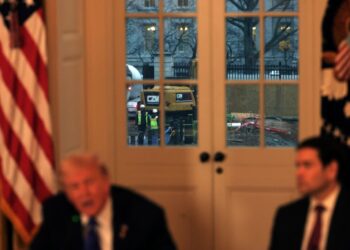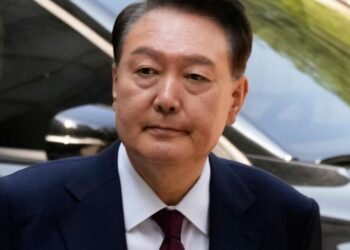“My name is Donald.”
President Donald Trump, arguably the most well-known person on the planet, rarely needs to introduce himself, especially to guests in the Oval Office. Yet the brash businessman turned conservative populist who has upended both political parties in America for the past decade can still surprise.
I was in the Oval Office last week to interview Trump one year after he won his second term. The focus of our talk on Nov. 13 was to be Pennsylvania and the Midwest — and how Trump has begun to remake industries, particularly steel and auto, through unconventional deals and tariffs.
I was briefly joined by my four grandchildren, whose ages range from 3 to 9, and my daughter, Shannon Venditti, a photojournalist who’s their mother. Trump, sitting at the Resolute Desk and smiling broadly, handed out treats to the kids before the 3-year-old asked him, “What’s your name?”
Trump’s answer drew giggles from the children — who had plans to come to D.C. with their mother and me before I requested the interview.
Trump has approached his second term with a gusto not seen in his first term — an unpredictable approach that leaves critics and supporters unable to gauge what comes next, what new policy he might adopt and what long-held positions he could drop. It has been several months since Trump reversed his initial disapproval of Nippon Steel’s planned purchase of U.S. Steel. The eventual deal was so important to the president, steelworkers and communities surrounding the three mills that make up U.S. Steel’s Mon Valley Works near Pittsburgh that it was marked by a rally in May. Nippon had promised billions of dollars of investment in the iconic American manufacturing company.
Trump arrived at the Irvin Works mill to celebrate the policy change that would enable the Japanese firm to reach an agreement with U.S. Steel, headquartered in Pennsylvania, a critical state in the president’s 2024 election victory.
If there ever was a hallmark moment for Trump and the working-class voters who took a chance on him, it was this. Despite months of Trump insisting he would block the deal, Pennsylvania voters knew they had one thing going for them: Trump has no problem changing his mind when presented new details.
United Steelworkers Local 2227 Vice President Jason Zugai, who has clocked in nearly three decades of work at Mon Valley Works, said he always had hope. He voted for Trump after attending his 2024 election eve rally in Pittsburgh at the PPG Paints Arena, where Trump told attendees he was not going to support the Nippon deal.
“I think that is the part of him the press often doesn’t understand and his voters do,” Zugai said. “He is a work in progress and shows no hesitancy in changing his mind. He is a negotiator in the way other politicians wouldn’t dream of.”
Zugai said Trump reminds him of his father, who consistently said “no” to his pleas. His father, however, would often come around after he considered all the circumstances around the requests.
“For people here in the middle of the country, in our daily lives you have to be nimble enough to change your mind if a situation demands it,” Zugai said. “That is what he does, and it isn’t something traditional politicians ever do. For us, it is the normal way of looking at problems.”
Trump said in the interview that a healthy American steel industry has always been one of his priorities. In 2018, he issued tariffs on steel and aluminum imports, a move applauded by Republicans and Democrats, including Conor Lamb, who was then running for Pennsylvania’s 18th Congressional District seat in a special election. Lamb, a Democrat, told The Post in 2018 it was time to “take some action to level the playing field here.”
The steel industry is the cornerstone for much of the country’s industrial development. It is a strong job creator for skilled labor, engineers, chemists, plant managers, pipe fitters, salespeople, welders and electricians. Infrastructure for construction, transportation and energy relies heavily on steel.
The 2018 tariffs — 25 percent on steel and 10 percent on aluminum imports — were crucial for construction and manufacturing industries; domestic production of the metals rose, and so did employment in those industries. The Biden administration never fully rescinded the 2018 tariffs.
“If we didn’t put that tariff on, you would not have a steel industry,” Trump told me. “The only reason (Nippon is) coming in is they don’t want to pay the 50 percent tariff. I could make it a 100 percent, 200 percent tariff. It’s the reason they bought U.S. Steel, and now they are spending money hand over fist, and they’re going to make U.S. Steel great again.”
Trump admits he was adamantly against the Nippon deal, until he was for it, something U.S. Steel CEO David Burritt painfully understood.
Burritt said the first time he met with Trump at the Oval Office in February, the conversation — much like the one I was having — darted between topics the president was curious about, so much so that the chief executive was worried he wouldn’t be able to explain why the Nippon deal would benefit the company, workers and Trump’s “America First” agenda.
Burritt didn’t get his pitch in, but he gave Trump a measure of who he was when Trump asked how he would navigate a foreign owner: He leaned in and said, “Mr. President, you think they’re going to be telling me what to do? Come on.”
Trump had still not moved on the issue but was warming to a deal he would orchestrate. One month later, Dave McCormick, the freshman Republican U.S. senator from Pennsylvania, sat with Trump at the NCAA Wrestling Championships finals in Philadelphia. McCormick could tell the wheels were turning in Trump’s mind about the possibility.
“Ultimately, what Trump wanted to do was protect those steelworkers’ jobs and everyone downstream of them, protect those communities, which had been declining because of the uncertainty of the industry, get the next generation technology and really lay the groundwork for us to be a dominant steelmaking country again,” McCormick said.
Trump smiled during our interview when discussing the ultimate outcome: “Well, we saved the steel industry.”
Burritt said Trump is not wrong. Without the deal and tariffs, the Mon Valley Works plants would have eventually shut down — a loss of thousands of jobs directly, thousands more indirectly. “People don’t really understand the chain reaction of economic and cultural effects this would have had on Pennsylvania,” Burritt said.
McCormick said Trump changing his mind or a lack of cohesive narrative on tariffs isn’t the flight of fancy some critics charge.
“I think the ultimate sign of strength is someone who can both put their views out there and then be open-minded about listening to the other side of the argument and evolving to the point where he changes his mind,” McCormick said.
Ford CEO Jim Farley has discussed the tariff dilemma with the Trump administration. What he admires most about the president, he said, is robust conversations and an open door to listening to concerns.
I spoke with Farley after he had finished his Sunday afternoon marking the grand opening of Ford’s first new headquarters since the 1950s. He said three key policies impact a heavy manufacturing company such as Ford, which makes nearly 80 percent of its vehicles in the United States, a higher percentage than its competitors: tariff and trade policies, U.S. emissions requirements and how the company accounts for large subsidies Chinese automakers receive from their government to produce vehicles.
Farley said initially he was impressed with the administration’s plan to level the playing field with Ford’s competitors from Japan and South Korea, which was out of balance thanks to cheaper labor and government subsidies.
It wasn’t until tariffs started stacking up that Ford realized it would result in a multibillion-dollar bill for the company. “That is when we started to engage with the government about the situation,” he said.
To his surprise, Farley found a flexible administration willing to engage at all levels about the unintended consequences of its policy.
“Yes, we still have a billion-dollar tariff bill that we didn’t have a year ago, but the tariff that our competitors see is much larger than Ford, and it’s because they chose to make their vehicles overseas, and we decided to build here,” he said.
My conversation with Trump went on for well over an hour. Though I’ve interviewed several presidents and vice presidents, he is the only one I’ve talked to in the Oval Office.
Trump is also the only one who often asks more questions than I do. His curiosity has always been his most compelling strength. When I interviewed him at a shale industry convention for the Atlantic in 2016, I noted he was much more interested in conversations with janitors, electricians and caterers than with the C-suite attendees.
No interview with him is conventional. For example, he asked me last week who I thought Democrats might nominate for president in 2028. He said of the current Democrats jockeying for that position, Rep. Alexandria Ocasio-Cortez (D-New York) has the best political instincts. This is something he warned Joseph Crowley about underestimating before Ocasio-Cortez defeated the congressman in a Democratic primary in 2018.
“I said, ‘You better be careful.’ I saw her. She’s out there hugging and kissing voters,” Trump recalled. “I said, ‘Are you going to debate with her?’ He said, ‘No, I’m not going to. I’m way up in the polls.’ I said, ‘All right, but I just think you have to be careful with her because she’s got talent.’” In the end, Crowley eventually did agree to debate Ocasio-Cortez one week before the primary.
At the end of the interview, my grandchildren were ushered back in. The 7-year-old became enthralled with the diorama of the new ballroom, while the 5- and 3-year-old climbed up on chairs in front of the fireplace, the same ones where Trump and Ukrainian President Volodymyr Zelensky had a tense exchange months ago.
I wanted to climb under a rock. I turned back to Trump expecting displeasure; instead, he grinned.
“Those chairs are totally reserved for prime ministers, presidents and kings,” he said to the kids. “I don’t care. The worst they can do is impeach me for an hour.”
As we left, the 3-year-old looked back and said, “Thanks, Donald, for the nice day.”
The post My unconventional interview with Trump
appeared first on Washington Post.




